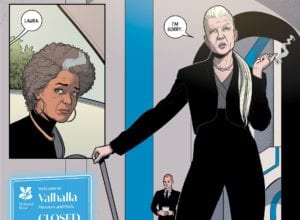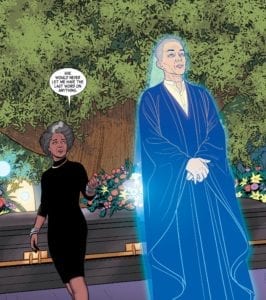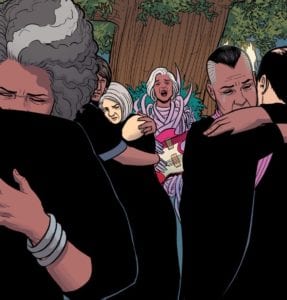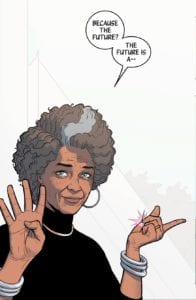“Every ninety years twelve gods reincarnate as young people. They are loved. They are hated. In two years they are all dead.
Lies.
It’s never going to happen again. Something else will.
Life goes on, until it doesn’t.”
This is how we bring such fabulous comic series to its end, with a sober acknowledgement that the theatricality is no more. While this is a very uneventful issue for a finale, it’s far from underwhelming. You may even say it couldn’t and shouldn’t end any other way. It’s thematically fitting for life to go on in the mundane, after all. And unlike Fables, its way of subversion doesn’t compromise fulfilment. Worry not, dear reader – although the musicians have retired, there’s still time for a brief, modest encore.
If you followed this comic throughout its run, then rest assured the waterworks are inbound. I honestly couldn’t do this thing justice to reprise the narrative effect of Kieron’s pen. I won’t go into much detail on what happens here, because not much happens at all. Rather I’ll write down my impressions, and what I believe may be an extraordinarily uplifting message for us all. And it takes place during the funeral of one beloved Cassandra Igarashi, 40 years since we last saw these divine people.
Wouldn’t she love the apparent irony of that?
Finale
Well, first things first. It turns out that Laura didn’t get a life sentence, as we thought she may have. In truth, she got to live a good, fruitful life. She had a relationship with Eleanor, which eventually ended. After that, Laura and Cass got together, as I believe many of us hoped, and they even tied the knot. But even in the happiest of marriages, a dark, dark truth creeps its way about: eventually death will do them part. And it did, much to Laura’s sorrow.

Eleanor is the first one to meet her at Valhalla, which became a museum and park. Isn’t this lovely, though? Not only are there hardly any resentments between former lovers, the place that once served the abode for the divine few has now turned into a place for the many. These little things start setting the tone for the rest of this issue. Age and death don’t merely waste things away – they transform and temper. Still, even time may not completely cauterise old wounds, as is the case for Zahid, the second person Laura meets in Valhalla. They still ache over Valentine, over his deeds, and how the nature of his person funneled him into performing terrible crimes.
Next, Laura and Zahid meet up with Jon and Aruna, the latter sporting a truly catching new body, courtesy of Jon’s perfectionism. Despite the brief brush with the uncanny in an otherwise pristine setting, it’s comforting to see that even she got a full life after godhood, even if she was just a head in the end. Enter the next scene and we see Cass’ former partners in Nornhood, Meredith and Zoe, also married. And finally, Umar: the heart of this collective. Through him, we acknowledge the overwhelming non-presence in the room. We’re not only mourning Cass. We’re also mourning the ones we lost along the way.
Cameron, Marian, Valentine. Go a little further back, and you’ll even think of those who weren’t much loved, like Emily and Ruth. And of course, depending on where you stand, you may even be grieving the Maiden and the Crone. With their death, a paradigm also has come to an end. The world without the Recurrence may seem a little duller on the surface. But don’t let that impression misguide you. The world has not lost its radiance. Cass reminds us of it through her coda, her own eulogy spoken via hologram, looking like a Jedi and a boss.
That’s so Cass.
I can’t do her words justice. You’re just gonna have to read them yourself. In summary, she speaks of all present. You can see how time and experience has changed her. Much like her former divine self, she still speaks the truth. She is kind but frank when needed be. All in all, it’s very heartwarming, and quite a tearjerker, and hilarious on occasion. However, aside from her peers and friends, present or otherwise, she briefly meditates on the world before, during, and after the gods. The experiences they lived through did not sink her perspective into bleak darkness. Instead, it drove them towards dreaming of and building a new world.

Such an enterprise outlives everyone, I think. But the dream never dies, corny as that surely sounds.
A lovely interpretation of WicDiv is an allegory for inspiration. The reprisal of Gods as performers immediately conjures up the notion of artistic inspiration. But look a little past that and you may see different kinds of inspiration, on things that comprise one’s worldview on a larger scale. The surviving former gods themselves apparently became imbued with inspiration to share what remains of those gifts with the rest of the world. Cass is not very specific on where those efforts went to make a difference, but one can dream it’s a lovely world they envisioned. Thus, the ultimately prometheic character of the comic returns to a more classical convention. Finally, Cass wraps up her eulogy by tearfully reprising Ananke’s finest words.
“I love you. I love you all. I’ll miss you.”
Aruna finally gets a proper moment to shine by performing a song for the last dance. Laura and her friends get to have as merry a time as they could, remember the ones they’ve lost, and have some bubbly. Laura sneaks out shortly in the middle of it all, as protagonists tend to do, and indulges by going a little meta and address the reader with a message. Prophecies, legends, designs outlined by fate – everything is a narrative, behind which there was a hand, a quill, and a will vulnerable to error. And not a single one of those authors can ever see what the future truly holds. Your life, and your future – they are yours alone, no matter what destinies dwell beneath or behind you.

This may be a way of saying that humanity moves onward, despite the yoke of old conventions. This is my own personal takeaway, at least. The aesop is broad enough that each reader may feel invited to give their own interpretation. However, it’s rather fitting that this comic develops and ends during our current times, when we find ourselves in the crux of old conventions clawing on to the present. Socially, politically, it really may feel like a generational fray, like our very own Anankes and Minervas butchering their young to maintain a rusty narrative going.
Do I digress? Absolutely, but I’m not apologising. And neither should you.
Well, so it ends, The Wicked + The Divine. Or at least for Laura and her friends. The span of the narrative is wide enough that we may yet get a few specials – who knows. Regarless, her closing message brings the underlying conflict of the story full circle. All throughout these two years in the narrative, the gift of power came at the price of fate-imposed demise. But that design was as fallible as its ancestral authors. The story is over, and never to be re-enacted. But the notion of performance lives on as Laura gives us a farewell. Her words are cut short by the end, signalling the uncertainty of the future. But we’re not ill-equipped to meet what tomorrow holds.
Her final gesture, the number four and the fingersnap is the last we see. It’s something we associate with the relation of power and fatalism in a god’s limited lifespan. But even though godhood is no longer, the motif doesn’t lose its charm.
That’s because being human is divine enough.
Thank you for reading.

The Wicked + The Divine Issue #45 Credits
Writer: Kieron Gillen
Art / Cover: Jamie McKelvie, Matt Wilson
Letters: Clayton Cowles
All images are courtesy of Image Comics

